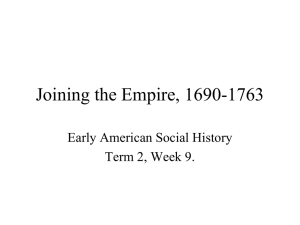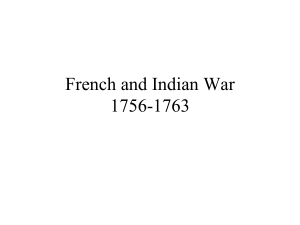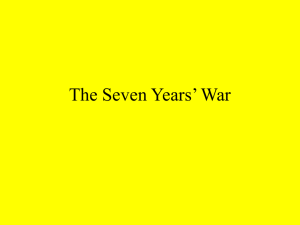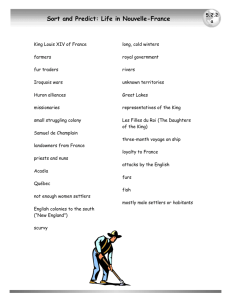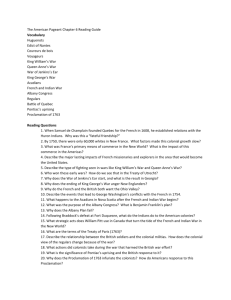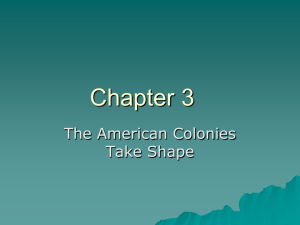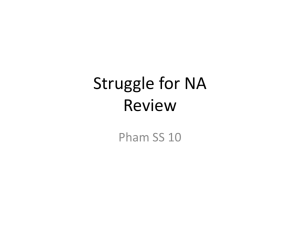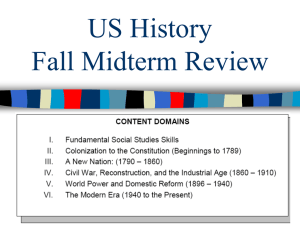Joining the Empire, 1690-1763 Early American Social History Term 2, Week 10.
advertisement
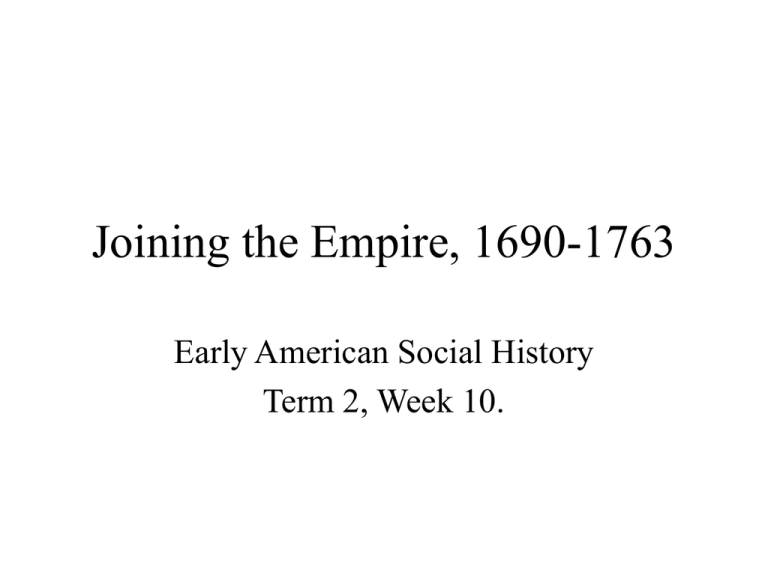
Joining the Empire, 1690-1763 Early American Social History Term 2, Week 10. Territorial Expansion • 18thC filling in of gaps in Br territory in America • Often through warfare, sometimes through simple expansion into ‘empty’ areas • Brings GB into conflict with France and Spain • Close relationship between European warfare and American warfare North America in 1700 Wars (1) • War of the League of Augsburg (King William’s War) 1689-1697 • Some cross border raids in New England and Acadia; Treaty of Ryswick leaves borders alone • War of Spanish Succession (Queen Anne’s War) 1701-1713 • Fought mainly in New England and South Carolina; NY remained neutral; fighting low-key, European victories of GB lead to Treaty of Utrecht and some permanent cession of territory in Europe (e.g. Gibraltar) and America Newfoundland • T of U acknowledges GB control of NFD. Previously settled, but privately. Mainly GB popn, (7,500 in 1750) • Important as allowed GB to control Grand Banks fishing grounds Nova Scotia • Originally Fr colony of Acadia, founded 1605 by Champlain. Br always wary of Acadia, on direct shipping route to Europe. • 1710 conquest of Acadia (except for Ille Royale) recognised by T of U. 2,000 Acadians remain, allowed to retain culture in return for allegiance. Acadians as distinct group in Fr society. • Problems over loyalty, expulsions 1755 - NS to be British • Founding of Halifax, replaced Port Royal as capital, migration encouraged from GB. Georgia • Founded 1733 as buffer for South Carolina and as haven for poor protestants. • Georgia ‘plan’; utopian? Attempt to prohibit slavery • Failure of plan, reasons (malcontents, ec problems) consequences • Georgia’s plantation economy, further territorial expansion, Indian cessions Wars (2) • War of Austrian Succession (King George’s War) 1744-1748 • Main American event was capture of Louisbourg, massive fort on Ille Royale, but returned to France in 1748 in return for Madras. British Attack Louisbourg 1745 British Army Disembarking at Louisbourg North America 1750 Seven Years War (French and Indian War) 1754 (6)- 1763 • Starts in America over competing land claims in Ohio valley - strategic importance of region. • GB joined with American colonial militia in attacks on Fr forts, (led by GW), mainly lost in first years of war • Onset of European war distracted Fr, allowed GB to channel all resources to America and India and cut of naval supplies to Fr colonies. • Albany Congress 1754, plan of Union. Fall of Canada • 1758-9 3-pronged attack on Canada, through Niagra, Lake Champlain, and the St Lawrence • Capture of Louisbourg, and its destruction • 1759 Battle of Plains of Abraham outside Quebec City, between Wolfe and Montcalm. • Both commanders killed, but Br won battle and took Quebec. • Gen. Amherst took Montreal in 1760, ended Fr rule in Canada. Capture of Louisbourg, 1758 Amherst marches on Louisbourg Death of General Wolfe Marquis de Montcalm End of the War • Sp entered war on Fr side 1761, also lost territory ie Havana and Manila • Treaty of Paris 1763 confirmed Br control of Canada. Spain exchanged Florida for Havana and Manila • Fr also lost control of St Vincent, Grenada, Tobago and India to GB and Louisiana to Sp (GB thought Sp less of a threat) France kneels before Britannia North America 1763 Before and After 1763 Floridas • GB split Florida into 2 colonies, East Florida (peninsular, cap St Augustine) and West Florida (panhandle as far as Mobile, cap Pensacola) • Problem of depopulation; Sp settlers left for Cuba, Fr settlers often remained, but numbers small, and upset by establishment of Ang chruch etc. • Most settlers from South Carolina and Georgia, tried to establish plantation economy, succeeding slowly but progress minimal by time of Revolution. Quebec • Fr Canada had popn of 80,000; placed under military rule 1760; Fr customs and lifestyle respected in order to induce settlers of remain • Gen Murray = ruler of Quebec, sympathetic to Fr concerns. • Quebec Act 1774, est boundaries of colony, huge including Ontario, Michigan, Wisconsin, Illinois, and Indiana. New system of govt did not allow elected assembly as Fr catholic majority would not be allowed to vote etc. • Seen with suspicion by other cols as possible blueprint for them Foundation of Colonies • • • • • • • • • Virginia 1607 Massachusetts 1630 Maryland 1634 Connecticut 1636 Rhode Island 1638 South Carolina 1663 North Carolina 1663 New York 1664 New Jersey 1664 • • • • • • • • • New Hampshire 1679 Pennsylvania 1681 Delaware 1683 Nova Scotia 1713 Newfoundland 1713 Georgia 1733 East Florida 1763 West Florida 1763 Quebec 1774 Possible new colonies • Ideas for new colonies during 1760s and 1770s. • Northern part of West Florida (near Natchez) • Trans-Appalachian ideas (Vandalia, Transylvania) steady trickle of settlers in this region despite Proclamation Line limiting settlement and reserving land for Indians. Conclusion • Britain at height of power in 1763. Controlled North America and India, and had good working relationship with various colonies. • Potential for Britain to dominate world, but seeds of destruction already sown.
